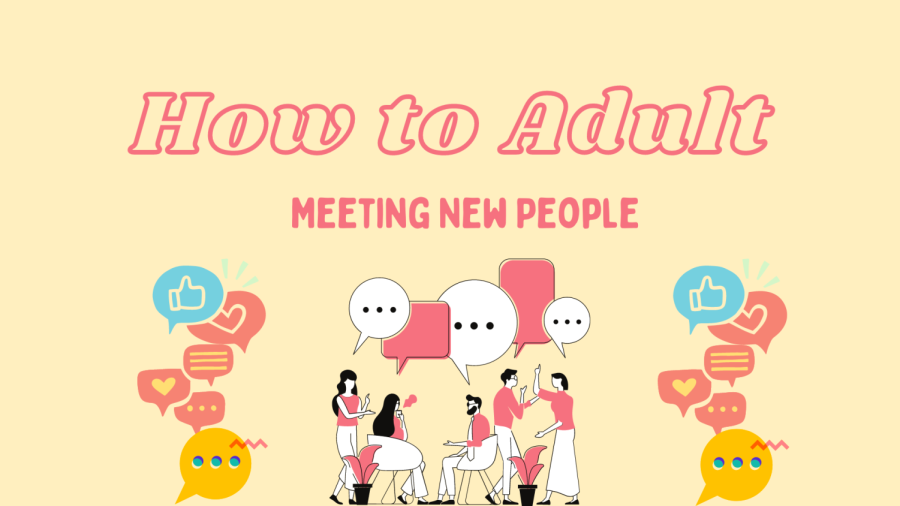How to Adult: Meeting New People
August 31, 2022
Welcome to the first article of FM Wire’s new feature series, “How to Adult.” How to Adult will teach students need-to-know adulting skills using the input of adults themselves. Thank you to Ms. Bell, Ms. Burris, Mr. Dalak, Ms. Garrett, Ms. Schmaltz, and Mr. Werts for interviewing for this article.
It is all too easy to settle for the label “socially awkward” while envying others’ ease of conversation, confident demeanor, and approach of strangers without hesitation. Yet as with most skills, socializing is learnable— even the most awkward person can gain strong social skills without sacrificing their sense of self.
In fact, introversion and extroversion do not necessarily define one’s capacity for social skills. Mr. Dalak and Mr. Werts, known for their outgoing personalities, actually both consider themselves introverts.
“People think I was born acting this way, with this confidence, and it’s not true. When I was young, I stuttered all the time. It’s a skill to interact with people and if you don’t, then you’ll never hone those skills,” Werts said.
Honing social skills means meeting new people. If approaching with a standard introduction feels too uncomfortable, try opening with an appeal to the universal desire for acknowledgement. Acknowledge someone with a low-stakes question like “How are you?” Give them a compliment. If nothing else, make eye contact and smile. Show them they are visible.
“There’s no way that you can have someone say something nice to you and not have that little spark of ‘thanks for noticing,’ that little internal smile. You can just kind of see [that] light glow,” Ms. Garrett said.
Acknowledgement also takes the form of finding common ground. It helps to reframe your mindset: it’s not just you going up to a stranger, but rather a challenge to learn more about someone else, to make them heard. Bonding over similarities will lend itself to learning about the differences that uniquely define someone.
“Humor, sarcasm, sometimes self-deprecating humor is helpful. Anything that you can connect about, like [with] glasses, ‘Oh my god, are you dealing with the humidity?’ It sort of goes organically from there,” Ms. Burris said.
Putting yourself in situations with like-minded people further facilitates the natural flow of conversation. It is, however, also worth challenging yourself to meet new people in ordinary situations; you don’t want to miss an opportunity for a friendship.
“Look them in the eye and say, ‘Hi.’ It’s two letters. You just make your face say it, right? There’s rejection, but how better to get used to having to deal with rejection than to be rejected?” Garrett said.
More often than not, people welcome invitations for friendships. Yet, even when faced with rejection, learning to react appropriately will only build social skills and self-confidence.
“If I go to a lunch table and I’m like, ‘Hey, can I sit here?’ The worst thing is they tell me no. And I’m like, ‘Right. I’m still alive. I’m still going to wake up tomorrow and be me,’” Ms. Schmaltz said.
Points of transition, such as high school to college, are laboratories for new relationships. Take advantage of the first few weeks of college to meet new people, as everyone is in the same position. In any new environment, the idea of meeting others can be intimidating, yet putting in the effort will only benefit your social skills and future happiness.
“When I was in Alabama, there were times I went home just in tears, like ‘I don’t have any friends’ and man, it was tough. I was rocking in the bathroom,” Mr. Dalak said. “But in certain situations, you have to just go and put yourself out there. Being brave isn’t about not being afraid. It’s about doing it, even though you are afraid.”
The same bravery required for meeting peers also applies to the corporate world. Beyond first impressions—being fully present, dressing appropriately, and using proper language—it is also necessary to be willing to approach others when in need of help.
“It’s important to be OK with saying ‘I’m not sure about this, can you explain it to me?’ Older people that have been in the profession for a while would appreciate that more than you pretending like you got this,” Ms. Bell said.
In any situation, authenticity is key. Manufactured confidence can help you initiate a conversation, but authenticity ultimately drives how you interact with others. Learn about others, and give them the opportunity to learn about you.
“I started talking to people because it’s like, why not?” Burris said. “We’re in this world together, I’d rather just talk to people and acknowledge that we all are in this fishbowl.”


